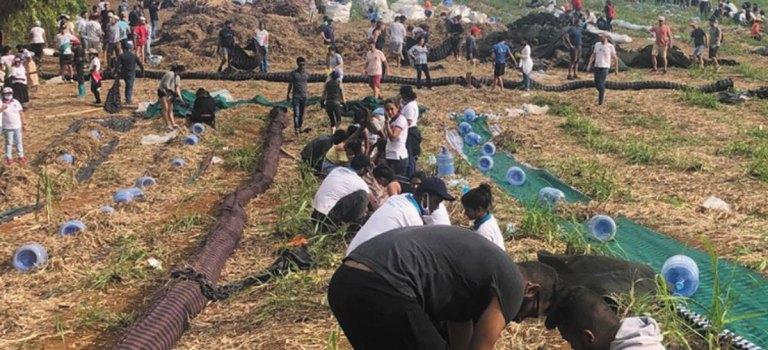Africa-Press – Mauritius. In the space of a few months, the country has experienced three crises: a health crisis with the Covid-19 pandemic, an economic crisis with the temporary cessation of economic activities due to compulsory confinement, and now an ecological crisis with the sinking. Japanese bulk carrier MV Wakashio on a reef near the country’s southeast coast on July 25.
Of course, no major crisis is predictable or easy to manage, but if there is a common thread between these three crises, it is the country’s systemic unpreparedness for exogenous shocks and the weakness of the management strategy with a view to mitigate the damage.
Indeed, the country is facing a double ecological and political catastrophe. An ecological disaster insofar as the hydrocarbons (300 tonnes of diesel and 3,800 tonnes of fuel oil) escaping from the bunkers of the bulk carrier represent a fatal danger to marine fauna and flora in the southeastern coastal region.
A political disaster because the authorities concerned (Ministry of the Environment, Ministry of Internal Affairs and Ministry of Fisheries) took 13 days to react to the ecological disaster that had been swelling since July 25, when the ship’s captain had sent his first distress signals.
Official slowness We cannot understand this official slowness as the inhabitants of the coastal region saw the oil spill spreading a little more each day.
Is this a case of criminal negligence on the part of the authorities concerned? It will no doubt take an independent investigation to pinpoint responsibility and establish whether the amateurism and incompetence of certain government departments has exacerbated an already difficult situation.
During the first days after the sinking, the government simply said without embarrassment that the situation was under control and that the photos of the oil spill were faked.
The main ministers waited 13 days before going to the scene to see the damage. French President Emmanuel Macron visited Lebanon two days after a warehouse explosion in the port of Beirut to express his solidarity with the Lebanese people.
As soon as he was called upon, he reacted swiftly to send us help from Reunion. Our concerned ministers, on the other hand, were busier with whipping up other cats, such as the campaign to elect their foal as head of a cultural federation and the attempt to scuttle a motion of censure against the mayor of a city.
That is to say that some officials do not have a sense of priorities, other than that they have the wrong priorities. They deal with political affairs rather than state affairs.
When a ship runs aground on a reef with a large cargo of heavy oils in its holds, it is already a big problem for the marine environment. One does not wait for the ship’s hull to crack before realizing the risk of heavy oil leaks.
We had already had a similar incident with the sinking of the vessel MV Benita in 2016. What lessons have the authorities drawn from it? Has the government updated its contingency plan, if there was one, to deal with any possible sinking of another ship in our area? To govern is to foresee, they say.
Contingency plan In 2004, the World Bank sponsored a National Oil Spill Contingency Plan under the auspices of the Indian Ocean Commission for Riparian Countries.
Has this plan been updated to adapt to the risks of a massive heavy oil spill in the lagoons? It seems that the government services (Coast Guard, Environment, Fisheries) have not been trained or equipped to deal with an ecological disaster.
They waited for a reaction from the Japanese shipowner when it was necessary to alert the riparian countries, France in particular, from the start and seek international help.
The country, as the prime minister confessed, does not have the expertise to recover the full amount of oil on board the ship or prevent heavy oil leaks.
It was precisely for this reason that it was necessary to act quickly and to secure all possible help from neighboring countries. The citizens of Mauritius did not procrastinate.
They have been ingenious, with the help of NGOs, to make and release floating ropes and giant sausages in the lagoons to prevent the oil spill from reaching the beaches. We must salute this approach by the Rezistans ek Alternativ group, environmental activists, fishermen and other anonymous volunteers.
They made efforts to collect materials used to make these sorbent dams (packing material, cane straws, hair, bagasse), which were released hundreds of meters in length into the black water.
Citizen initiative It is a salutary and admirable initiative of civil society which brought together citizens, all communities combined, in a process of patriotism.
Mauritians have proven that they can surpass themselves and unite around a common cause despite attempts at political or ethnic division and acts of intimidation by the authorities.
They showed a keen awareness of the importance of ecology in a country which has only the sea and its beaches as natural resources. They know that natural ecosystems are at the center of sustainable development in this country where trees are cut down and concrete everywhere in the name of false modernity.
Instead of encouraging the citizens’ initiative, the government chose to enact regulations to make certain places in the south inaccessible to citizens.
What is he afraid of? May the citizens take their destiny into their own hands in the face of the inaction of the authorities and without depending on the politicians who have created a culture of assistantship in this country.
A country moves forward when citizens take action, not when the government orders them to do anything. The ubiquitous and prevaricating state that decides everything, which decides what is right and wrong and which makes its leaders cult leaders is bad for democracy and good governance. A submissive society paralyzes good citizen initiatives.
For More News And Analysis About Mauritius Follow Africa-Press







